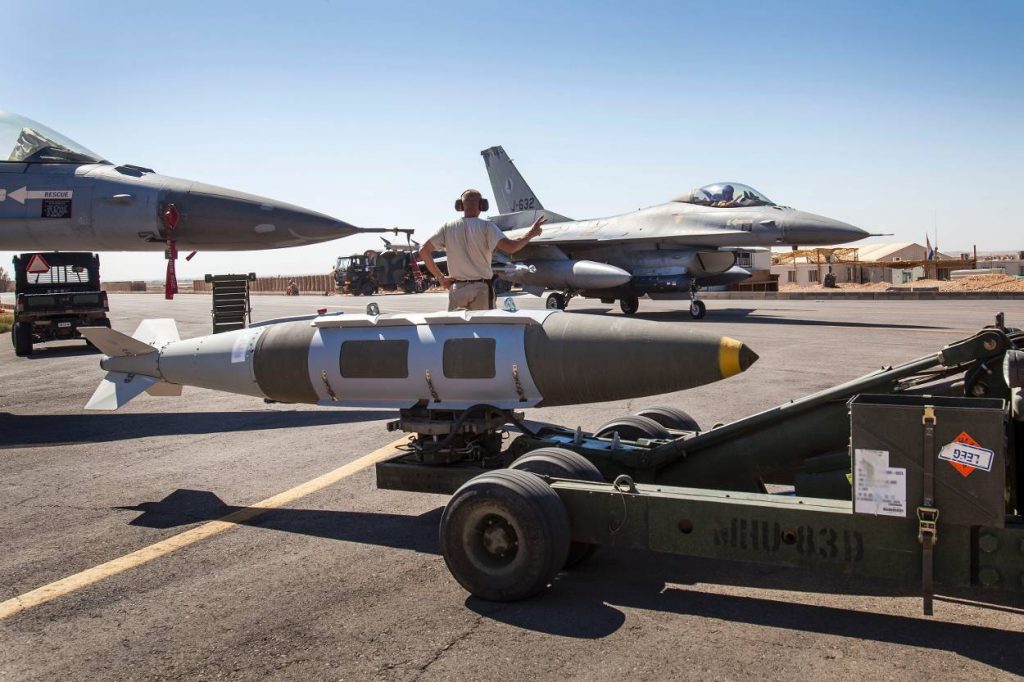Dutch military still refuses to say where or when civilians were killed or injured in Iraqi strikes – or how many casualties.

The Netherlands Public Prosecution Service has found that Dutch forces killed or injured civilians during anti-ISIS operations in up to three historical incidents in Iraq.
However the country’s military has since told Airwars it is still refusing to divulge when between 2014 and 2016, or exactly where in Iraq the incidents took place for reasons of national and operational security.
The new findings relating to four separate airstrikes — all in Iraq — were released in a progress report on Dutch involvement in the anti-ISIS Coalition, presented to Parliament on April 13th.
While the report found that none of the strikes had violated the laws of war, it did reveal for the first time that Dutch aircraft had caused civilian harm. Until now the Netherlands has denied all such claims.
‘Civilian casualties did occur’
The report described in some detail the sequence of events surrounding each incident. But crucially it omitted the dates and locations for each event – preventing them from being matched against almost 1,000 alleged Coalition civilian casualty incidents in Iraq since 2014. The Netherlands has also given no indication of how many civilians were killed or injured in each event.
In the first case, Dutch F-16s were involved in an attack on a suspected vehicle-borne IED plant. “The IED factory turned out to have more explosives than previously known, or could have been calculated,” said the prosecutor’s office. The prosecutor noted that the attack “ led to the destruction of buildings in the area” and said ”it is very likely that civilian casualties occurred during this attack.”
In a second case – in which the Prosecution Service explicitly found that “civilian casualties did occur” – Dutch aircraft were involved in attacking a building that had been identified as an “ISIS headquarters” but was later found to be a residential building. Notably, the report to Parliament cited faulty Coalition intelligence. “Before and during the deployment the F-16 pilots had no indication that the information was incorrect,” Parliament was told.
A third case was described as a car driving “suddenly” into the blast area of a strike on a building, during which time “civilian casualties were possible.”
The last case investigated involved the incorrect targeting of a building, which the report said was due to the wrong settings in an F-16 targeting system. No civilian deaths were believed to have resulted, the Dutch government report found.
Though civilian deaths were confirmed or likely in three of the four cases reviewed, the Public Prosecution Service determined that international humanitarian law had not been violated during any of the attacks. Even so, the investigation found that Dutch military actions had led to civilian harm.
‘Dutch government must now step forward’
The Netherlands now takes its place alongside the United States and Australia as the only members of the 13-member Coalition to admit to causing civilian casualties during anti-ISIS operations in Iraq or Syria.
However, unlike Australia or the US, the Netherlands is still refusing to release dates and locations for the strikes in question, making external evaluations of their findings impossible. Airwars asked the Dutch Ministry of Defense why, and was told by a spokesperson that on national and operational security grounds nothing further would be divulged.
Between October 2014 and July 2016, Dutch F-16s fired more than 1,800 munitions in hundreds of airstrikes against ISIS targets in both Iraq and Syria. In January 2018, the Netherlands once again resumed strikes after swapping in with its Benelux partner Belgium.
“With the Netherlands for the first time admitting civilian harm from its actions in the war against ISIS, it is unacceptable that the locations and dates of the airstrikes are still not being released,” said Airwars Dutch advocacy officer Koen Kluessien. “How can affected Iraqis and Syrians ever have accountability for their loved ones? It’s time for the Dutch government to step forward, and take full responsibility for these sad events.”